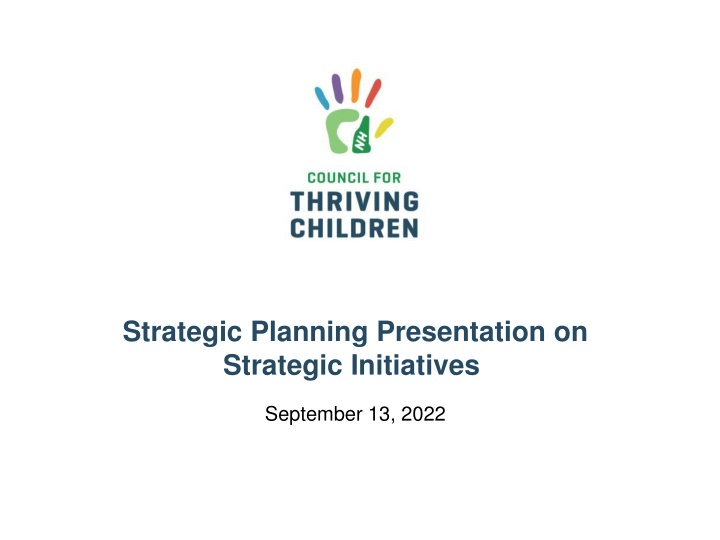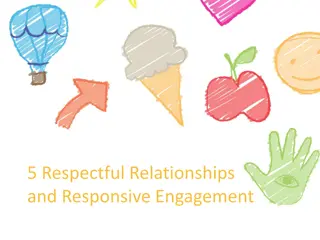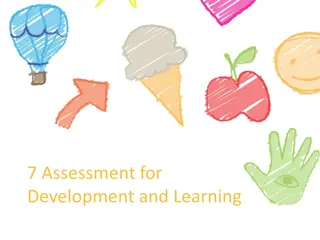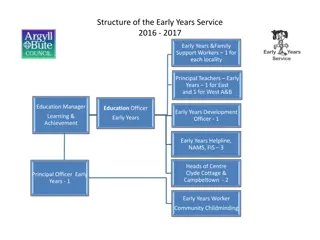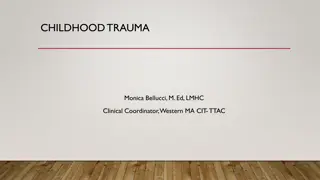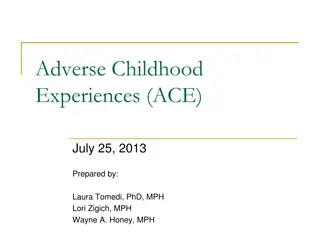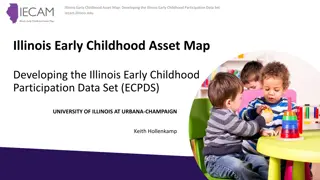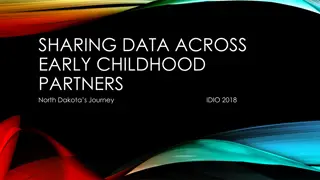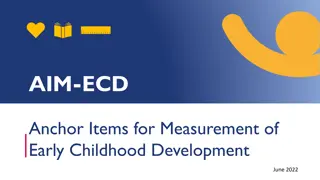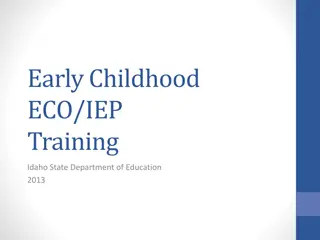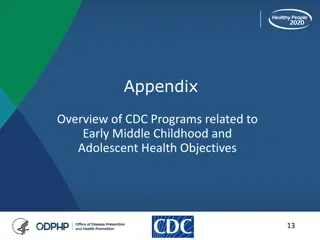Early Childhood Strategic Plan Overview
The presentation outlines the strategic initiatives and objectives of the Early Childhood Strategic Plan, focusing on enhancing support for all New Hampshire families to ensure their well-being and development. It includes an overview of the planning process, proposed strategic themes, and priority outcomes to achieve the vision of healthy, thriving families. The agenda highlights key discussions on strategic initiatives and next steps for implementation.
Uploaded on Sep 16, 2024 | 1 Views
Download Presentation

Please find below an Image/Link to download the presentation.
The content on the website is provided AS IS for your information and personal use only. It may not be sold, licensed, or shared on other websites without obtaining consent from the author.If you encounter any issues during the download, it is possible that the publisher has removed the file from their server.
You are allowed to download the files provided on this website for personal or commercial use, subject to the condition that they are used lawfully. All files are the property of their respective owners.
The content on the website is provided AS IS for your information and personal use only. It may not be sold, licensed, or shared on other websites without obtaining consent from the author.
E N D
Presentation Transcript
Strategic Planning Presentation on Strategic Initiatives September 13, 2022
Agenda 1. Purpose Martha Greenway 2. Overview of Strategic Planning Process Martha Greenway 3. Presentation of Strategy Teams Suggested Strategic Initiatives Martha Greenway and Christine Koehn 4. Council Discussion a. Clarifying Questions b. Initiatives that are not Supported c. Significant Substantive Changes to Wording 5. Council Discussion a. Essential Strategic Initiatives That are Missing 6. Next Steps Martha Greenway 2
Todays Purpose Review and seek to understand Strategy Team recommended strategic initiatives Identify any initiatives that are of concern (that members do not think they can support) Make any significant conceptual changes to language of the strategic initiatives Identify any missing strategic initiatives that are essential to achieving the objectives Confirm next steps 3
Project Overview Environmental Scan Stakeholder Engagement Phase 1: Analysis February - March Analyze Implications Define Desired Future: Priority Outcomes Phase 2: Develop Strategic Themes, Objectives Strategy Development April - September Define Strategic Initiatives Phase 3: Action Planning September- October Create Action Plans Develop Monitoring and Review Process We are here 4
Vision: All NH families are afforded comprehensive and responsive supports, so they are healthy, learning, and thriving now and in the future. Early Childhood Strategic Plan Framework 6.14.22 Objectives Themes 1. Increase early intervention and primary prevention 2. Increase accessible childcare and early learning options 3. Increase family awareness, voice, influence, engagement and knowledge 4. Enhance quality of early childhood programs and services Strategic Theme 1 Quality, consistent, equitable access to opportunities and services for all NH families Priority Outcomes Increase families partnership in, knowledge of, and choices for their child s development Increase families access to integrated quality early childhood opportunities and services Increase comprehensive wellness of young children Ensure children achieve early childhood developmental and educational goals Increase providers and educators knowledge and access to resources for quality programs and services Strategic Theme 2 Early childhood workforce capacity and quality 1. Increase workforce 2. Increase knowledge of workforce regarding early childhood development Strategic Theme 3 Investment in early childhood programs and services 1. Leverage and sustain new and existing funding 2. Increase business and community support for early childhood programs and services 1. Increase state, regional, and local level collaboration and program integration 2. Enhance family navigation of integrated programs and services 3. Increase community voice and influence in design of programs and services Strategic Theme 4 Systems integration 1. Ensure a cohesive and collaborative approach to a mixed- delivery, early childhood system 2. Expand public understanding of the importance of quality early childhood experiences for all children Strategic Theme 5 Office of Early Childhood
Strategic Initiative Checklist Results in sustained changes in practices and approaches Targets observable, tangible changes in system and staff behavior Not episodic events or activities Not reliant upon a specific, externally marketed product Generally require cross-functional, multi-year efforts to full implement Sufficient impact to transform statewide practice and improve one or more priority outcomes 6
Strategic Theme: Include the title of your strategic theme from the strategic planning framework. Team Members Team Members: List team members in alphabetical order by last name, with their title and department/organization. Objective Objective 1: 1: Include the objective from the strategic planning framework. Success Defined: Success Defined: If this objective is achieved, how will we know? What changes will we observe in children, families, providers and systems? What results will improve? Strategic Initiative 1A: Strategic Initiative 1A: Include a short phrase or title that defines the effort on the part of the district that will bring about fundamental changes to improve this objective. occur in the action planning stage to follow in January. Rationale: Rationale: Provide references to support the efficacy of this initiative in improving the objective. What evidence or experience suggests this effort will bring about the desired change? How does this initiative reflect stakeholder input? Important findings for implementation: Important findings for implementation: If your research revealed essential practices or conditions that are necessary for effective implementation of the initiative, include those in this section. Brief Description: Brief Description: Add a few sentences to more fully articulate what this strategic initiative entails. Describe what will be developed or implemented, the types of employees targeted and what changes in behavior are required. Do not detail the action steps or resources needed to implement the initiative this will 7
Strategic Theme 1 Quality, consistent, equitable access to opportunities and services for all NH families Team Members Name Organization Marianne Barter NH Child Care Advisory Council Bureau of Child Development and Head Start Collaboration. DHHS/Division of Economic & Housing Stability Parent Information Center NH Department of Employment Security NHED, Office of Social Emotional Wellness Milford Thrives/Milford Kids Thrive DHHS ECIT:DPHS/BPHCS MCH Home Visiting Program DHHS ECIT, Child Protection DHHS ECIT- Office of Health Equity NHED, Migrant Education Program Annie Censullo Robin deAlmeida Richard Lavers Katherine Leswing Joelle Martin Aurelia Moran Christine Morrissey Shirley Tomlinson Rachel Valladares 8
Strategic Theme 1 Quality, consistent, equitable access to opportunities and services for all NH families Objective 1: Increase early intervention and primary prevention Initiative 1a: Eliminate barriers to access by engaging diverse family perspectives early in the planning process Increase provider awareness of and collaboration with all available primary prevention and early intervention services Initiative 1b: 9
Strategic Theme 1 Quality, consistent, equitable access to opportunities and services for all NH families Objective 2: Increase accessible childcare and early learning options Expand eligibility for childcare assistance costs, increase the amount of assistance for each family, and increase awareness and utilization of NH Child Care scholarship assistance Expand options for and access to childcare and early learning statewide, particularly in areas where options are limited Initiative 2a: Initiative 2b: 10
Strategic Theme 1 Quality, consistent, equitable access to opportunities and services for all NH families Increase family awareness, voice, influence, engagement, and knowledge Objective 3: Establish a Statewide Family Engagement Framework including feedback loops Expand Welcome Baby program to every baby in New Hampshire Expand NH parent/caregiver access to family support/Family Resource Centers (FRCs) Initiative 3a: Initiative 3b: Initiative 3c: 11
Strategic Theme 1 Quality, consistent, equitable access to opportunities and services for all NH families Objective 4: Enhance quality of early childhood programs and services Initiative 4a: Initiative 4b: Increase participation in NH QRIS Increase family awareness of quality care and early learning options 12
Discussion 1. What clarifying questions do you have? 2. Are there any of the recommended strategic initiatives that you could not support? 3. Is there any language that requires significant, substantive change? 13
Strategic Theme 2 Early childhood workforce capacity and quality Team Members Name Organization Bureau of Child Development working on workforce initiatives B8 & NH Family Voices NHED, Office of Social Emotional Wellness DHHS ECIT: DPHS/BPHCS MCH Home Visiting Program Division of Economic and Housing Stability NH DHHS Bureau of Career Development DHHS: workforce Comprehensive Family Support Services Dianne Chase Kendra Dix Jen Doris Kristi Hart Marti Ilg Nicole Levesque Gene Patnode Sue Watson 14
Strategic Theme 2 Early childhood workforce capacity and quality Objective 1: Increase workforce Initiative 1a: Initiative 1b: Promote early childhood careers and career path Engage more people into the early childhood field Promote the availability of workforce incentives and tax credits and expand them beyond early childhood education to include family support and health Initiative 1c: 15
Strategic Theme 2 Early childhood workforce capacity and quality Increase workforce knowledge regarding early childhood development Objective 2: Equip the early childhood workforce with evidence-based practices to meet the needs of children and families Initiative 2a: 16
Discussion 1. What clarifying questions do you have? 2. Are there any of the recommended strategic initiatives that you could not support? 3. Is there any language that requires significant, substantive change? 17
Strategic Theme 3 Investment in early childhood programs and services Team Members Name Organization Christine Brennan NHED, Deputy Commissioner New Hampshire Charitable Foundation Christina D Allesandro Joelyn Drennan NH Children s Trust Bureau of Child Development and Head Start Collaboration Division of Economic and Housing Stability DHHS ECIT NH Family Voices NHED, Division of Learner Support NH Senate Ben Hoffman Debra Nelson Terry Ohlson-Martin Melissa White Becky Whitley 18
Strategic Theme 3 Investment in early childhood programs and services Objective 1: Leverage and sustain new and existing funding Initiative 1a: Create and implement a comprehensive early childhood system funding plan Develop and implement a wages study across the various roles within the early childhood field Initiative 1b: 19
Strategic Theme 3 Investment in early childhood programs and services Increase business and community support for early childhood programs and services Objective 2: Initiative 2a: Create and implement a plan to increase businesses financial investment in the early childhood system Create and implement a plan to increase community awareness of and engagement in building the capacity of the early childhood system Initiative 2b: 20
Discussion 1. What clarifying questions do you have? 2. Are there any of the recommended strategic initiatives that you could not support? 3. Is there any language that requires significant, substantive change? 21
Strategic Theme 4 Systems Integration Team Members Name Organization NAMI New Hampshire (National Alliance on Mental Illness) NH Alliance of Early Childhood Coalitions (representing the EC Regional leads on B8) Office of Social Emotional Wellness NHED B8 & Parent Information Center DHHS/DEHS/Bureau of Child Development and Head Start Collaboration NH DHHS- Children s Behavioral Health Amoskeag Health Office of Social Emotional Wellness NHED DHHS ECIT Portsmouth School Department Sandy Alonzo Sarah Fox Stefanie King Michelle Lewis Claudette Mallory Hannah MaynardYung Lara Quiroga Molly White Heidi Young Steve Zadravec 22
Strategic Theme 4 Systems Integration Increase state, regional, and local level collaboration and program integration Objective 1: Affirm and institutionalize the early childhood regions and networks, ensure ongoing support, and foster collaboration with families and local communities Formalize, strengthen, and broaden local early childhood coalitions that integrate with regional and state structures Establish a shared, compatible early childhood data system to inform decision-making Initiative 1a: Initiative 1b: Initiative 1c: 23
Strategic Theme 4 Systems Integration Enhance family navigation of integrated programs and services Objective 2: Initiative 2a: Establish and promote a comprehensive and inclusive system for families to navigate and access resources that leverage existing tools Increase individualized support for families in navigating the system Build cultural and linguistic competence of early childhood professionals to better support families Initiative 2b: Initiative 2c: 24
Strategic Theme 4 Systems Integration Increase community voice and influence in design of programs and services Objective 3: Create approaches to specifically engage under- represented groups to influence decisions about programs and services that affect them Note that 1b also addresses this objective: Formalize, broaden, and strengthen local early childhood coalitions that integrate with regional and state structures Initiative 3a: 25
Discussion 1. What clarifying questions do you have? 2. Are there any of the recommended strategic initiatives that you could not support? 3. Is there any language that requires significant, substantive change? 26
Strategic Theme 5 Office of Early Childhood Team Members Name Organization Jeanne Agri Jane Bard Athena Cote Community Action Program Belknap-Merrimack Children's Museum of New Hampshire DHHS New Hampshire Charitable Foundation Department of Education DHHS ECIT Parent Representative (Employee at DHHS, but on Team as representative of Parents NHED, Office of Social Emotional Wellness Parent Representative/ New Futures Christina D Allesandro Krisha A Dubreuil Debra Nelson Colleen Popores Molly White Rebecca Woitkowski 27
Strategic Theme 5 Office of Early Childhood Objective 1: Ensure a cohesive and collaborative approach to a mixed- delivery, early childhood system Establish a collaborative process to define the role of the Office of Early Childhood, including structure, primary responsibilities, fiscal structure and functions Establish authority in Office of Early Childhood for leadership of Office to cultivate political will Initiative 1a: Initiative 1b: 28
Strategic Theme 5 Office of Early Childhood Objective 2: Expand public understanding of the importance of quality early childhood experiences for all children Coordinate messaging across key early childhood champions to ensure a diverse set of voices that will expand public understanding of the importance of early childhood experiences for all children and families Clarify and communicate roles and responsibilities of the early childhood system to include early childhood agencies, families, policy makers, service providers Initiative 2a: Initiative 2b: 29
Discussion 1. What clarifying questions do you have? 2. Are there any of the recommended strategic initiatives that you could not support? 3. Is there any language that requires significant, substantive change? 30
Vision: All NH families are afforded comprehensive and responsive supports, so they are healthy, learning, and thriving now and in the future. Early Childhood Strategic Plan Framework 9.9.22 Themes Objectives Initiatives 1a. Eliminate barriers to access by engaging diverse family perspectives early in the planning process 1b. Increase provider awareness of and collaboration with all available primary prevention and early intervention services 2a. Expand eligibility for childcare assistance costs, increase the amount of assistance for each family, and increase awareness and utilization of NH Child Care scholarship assistance 2b. Expand options for and access to childcare and early learning statewide, particularly in areas where options are limited 3a. Establish a Statewide Family Engagement Framework including feedback loops 3b. Expand Welcome Baby program to every baby in New Hampshire 3c. Expand NH parent/caregiver access to family support/Family Resource Centers (FRCs) 4a. Increase participation in NH QRIS 4b. Increase family awareness of quality care and early learning options 1. Increase early intervention and primary prevention 2. Increase accessible childcare and early learning options 3. Increase family awareness, voice, influence, engagement and knowledge 4. Enhance quality of early childhood programs and services Strategic Theme 1 Quality, consistent, equitable access to opportunities and services for all NH families Priority Outcomes Increase families partnership in, knowledge of, and choices for their child s development Increase families access to integrated quality early childhood opportunities and services Increase comprehensive wellness of young children Ensure children achieve early childhood developmental and educational goals Increase providers and educators knowledge and access to resources for quality programs and services 1a. Promote early childhood careers and career path 1b. Engage more people into the early childhood field 1c. Promote the availability of workforce incentives and tax credits and expand them beyond early childhood education to include family support and health 2a. Equip the early childhood workforce with evidence-based practices to meet the needs of children and families 1. Increase workforce 2. Increase workforce knowledge regarding early childhood development Strategic Theme 2 Early childhood workforce capacity and quality 1. Leverage and sustain new and existing funding 2. Increase business and community support for early childhood programs and services 1a. Create and implement a comprehensive early childhood system funding plan 1b. Develop and implement a wages study across the various roles within the early childhood field 2a. Create and implement a plan to increase businesses financial investment in the early childhood system 2b. Create and implement a plan to increase community awareness of and engagement in building the capacity of the early childhood system Strategic Theme 3 Investment in early childhood programs and services 1a. Affirm and institutionalize the early childhood regions and networks, ensure ongoing support, and foster collaboration with families and local communities 1b. Formalize, strengthen and broaden local early childhood coalitions that integrate with regional and state structures 1c. Establish a shared, compatible early childhood data system to inform decision-making 2a. Establish and promote a comprehensive and inclusive system for families to navigate and access resources that leverage existing tools 2b. Increase individualized support for families in navigating the system 2c. Build cultural and linguistic competence of early childhood professionals to better support families 3a. Create approaches to specifically engage under-represented groups to influence decisions about programs and services that affect them 1. Increase state, regional, and local level collaboration and program integration 2. Enhance family navigation of integrated programs and services 3. Increase community voice and influence in design of programs and services Strategic Theme 4 Systems integration 1a. Establish a collaborative process to define the role of the Office of Early Childhood, including structure, primary responsibilities, fiscal structure and functions 1b. Establish authority in Office of Early Childhood for leadership of Office to cultivate political will 2a. Coordinate messaging across key early childhood champions to ensure a diverse set of voices that will expand public understanding of the importance of early childhood experiences for all children and families 2b. Clarify and communicate roles and responsibilities of the early childhood system to include early childhood agencies, families, policy makers, service providers 1. Ensure a cohesive and collaborative approach to a mixed-delivery, early childhood system 2. Expand public understanding of the importance of quality early childhood experiences for all children Strategic Theme 5 Office of Early Childhood
Discussion Are there any strategic initiatives that are essential to achieving these objectives that are missing? 32
Next Steps Hold three community forums for input into strategic initiatives and implementation September 20, 1:00-2:30 pm, Gorham September 21, 9:30-11:00, Concord September 22, 6:00-7:30, via Zoom Convene groups to develop strategic initiative action plans We will set 2-hour workshop dates for each strategic initiative Members of the Council, Subcommittee and Strategy Teams may join any workshop Workshops will be held between October 1 and October 28 Dates will be announced next week (week of September 19) Share strategic plan implementation plan with Council for Thriving Children on November 8 33
